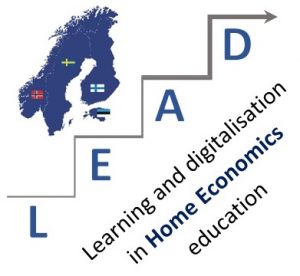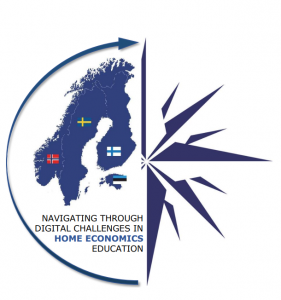NAVI-HED -project – Navigating through digital challenges in Home economics education (2021-2023)
Material package designed in frames of the NAVI-HEDproject for teachers is ready to use – please feel free to upload and get inspired:
-FINNISH: NAVI material_FIN FINAL
-ENGLISH:NAVI material_ENG FINAL
-SWEDISH:NAVI material_SWE FINAL
-NORWEGIAN:NAVI_material_NOR FINAL
-ESTONIAN:NAVI_material_EST FINAL
 LEAD-project –Learning and digitalisation in home economics education (2018-2021)
LEAD-project –Learning and digitalisation in home economics education (2018-2021)
Material package designed in frames of the LEAD project for teachers is ready to use – please feel free to upload and get inspired:
– FINNISH: LEAD material in Finnish
– ENGLISH: LEAD material in ENGLISH
– SWEDISH: LEAD material in Swedish
– NORWEGIAN: LEAD material in Norwegian
– ESTONIAN: LEAD material in Estonian
FOLLOW US
https://www.facebook.com/LEAD-project-368690370342095/
WHO WE ARE?
The Nordic-Baltic countries involved in this project have met similar challenges in using digital tools in Home economics education. However, digital tools are only one side of the coin: it is equally important to find methods to implement digital technology into subject teaching in a pedagogically meaningful way. Implementation of meaningful pedagogical methods in home economics education will help students to construct knowledge, develop their skills and critical thinking, instead of just increasing their outer motivation as the use of information and communications technology often does.
During our first Erasmus+ funded LEAD project – Learning and digitalization in Home economics we developed tools and teaching materials needed for addressing the present-day challenges related to digital practices in schools. We widened teachers’ understanding on how to purposefully use digital tools in home economics classrooms, for example when supporting student’s learning both in individual and in group work tasks.
Taking this co-designed knowledge further, our second Erasmus+ funded NAVI-HED project – Navigating through digital challenges in Home economics education focuses on supporting home economics teachers by finding good practices and teaching methods which enhance the quality of student’s learning by using digital tools in a purposefully in distance/blended teaching.
Our core team represents four universities responsible of educating home economics teachers:
Tallinn University: Jaana Taar, Kristi Koppel, Tiina Vänt
University of Helsinki: Päivi Palojoki, Anne Malin, Janni Haapaniemi, Hille Janhonen-Abruquah
University of Gothenburg: Jenny Rendahl, Sara McGarvie, Malin Rödin
University of Agder: Gun Åbacka, Hanne Andersen Dversnes, Mona Linge Omholt, Cecilie Beinert
WHAT ARE OUR AIMS?
The lock-down in 2020 in many countries showed that especially home economics teachers faced new challenges when trying to give independent learning tasks for students at home. It also confirmed the need to have knowledge and strong skills in using digital tools so that it is possible to support students learning in a best way also in the future. For example, when students who due to various reasons are unable to participate in classroom activities and need to be accessed with distance learning methods. It is difficult to instruct as well as to evaluate students’ food preparation skills from a distance, and skills related to sensory evaluation are practically impossible if the teacher and the student cannot share at least visual images of the product prepared.
The challenges of using digital tools in a pedagogically wise way prevail also after the COVID-19 pandemic. Our projects aims to collect good practices, to support home economics teachers, and to disseminate these novel practices to schools so that the teachers would have the knowledge and skills to use digital tools in a pedagogically supportive way when needed, either in the context of distance/blended teaching or in the classrooms.
WHAT KIND OF OUTPUTS DO WE EXPECT?
We expect that the developed materials and pedagogical methods raise the quality of learning in Home economics. This will help students to deepen their knowledge structures by integrating previous knowledge and skills from other school subjects as well as from students’ out of schools learning situations. We expect that when teachers use our new digital methods and tasks in their lessons, they will also have knowledge and courage to develop similar tools and methods further.
Our novel digital materials and pedagogical innovations can be modified and applied in another school subjects or out of school activities too. After the project periods have ended, all partners will continue disseminating the materials and methods developed through their ordinary teacher education and in-service teacher training. Gained knowledge will also be shared to academic readers through scientific articles and conference presentations.

